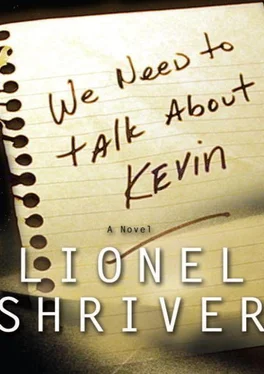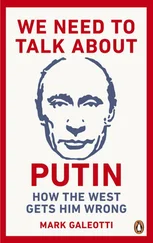Thus it took a supreme effort to lift my eyes and turn my head when a flicker of motion in the mouth of the hallway distracted from the perfect stasis of our still life. Kevin took a deliberate step into the light. One glance confirmed that he’d been eavesdropping. He looked different. Those sordid afternoons with the bathroom door open notwithstanding, this was the first time in years I had seen him naked. Oh, he was still wearing the normal-sized clothes from the hearing. But he’d lost the sideways skew; he stood up straight. The sarcastic wrench of his mouth dropped; his features were at rest. I thought, he really is “striking,” as his drama teacher purportedly remarked. He looked older. But what most amazed me were his eyes. Ordinarily, they glazed with the glaucous film of unwashed apples—flat and unfocused, bored and belligerent, they shut me out. Sure, they glittered with occasional mischief, like the closed metal doors of a smelting furnace around which a little red rim would sometimes smolder, from which stray flames would lick. But as he stepped into the kitchen, the furnace doors swung wide to bare the jets.
“I need a drink of water,” he announced, somehow managing to hiss without pronouncing any S’s, and strode to the sink.
“Kev,” you said. “Don’t take anything you might have overheard to heart. It’s easy to misunderstand when you hear something out of context.”
“Why would I not know the context?” He took a single swallow from his glass. “I am the context.” He put the glass on the counter, and left.
I’m certain of it: That moment, that hard swallow, is when he decided.
A week later, we received another letter from the school board. Already relieved of her classes when the accusations were first made, Vicki Pagorski would be permanently removed to administrative duties and never allowed direct supervision of students again. Yet in the absence of any evidence beyond the boys’ word against hers, she was not to be discharged. We both found the decision cowardly, though for different reasons. It seemed to me that she was either guilty or she was not, and there was no justification for taking an innocent from an occupation that she clearly adored. You were outraged that she was not to be fired and that none of the other parents planned to sue.
After slumping around the house as pointedly as one can go about an exercise that is essentially rounded, Kevin confided in you that he had grown depressed. You said you could see why. Stunned by the injustice of the school board’s slap on the wrist, Kevin felt humiliated, so of course he was depressed. Equally you fretted that he had intuited an impending divorce that we both wanted to put off making official until we had to.
He wanted to go on Prozac. From my random sampling, a good half of his student body was on one antidepressant or another, though he did request Prozac in particular. I’ve always been leery of legal restoratives, and I did worry about the drug’s reputation for flattening; the vision of our son even more dulled to the world boggled the mind. But so rarely out of the States those days, I, too, had acculturated myself to the notion that in a country with more money, greater freedom, bigger houses, better schools, finer health care, and more unfettered opportunity than anywhere else on earth, of course an abundance of its population would be out of their minds with sorrow. So I went along with it, and the psychiatrist we sought seemed as happy to hand out fistfuls of pharmaceuticals as our dentist to issue free lollipops.
Most children are mortified by the prospect of their parents’ divorce, and I don’t deny that the conversation he overheard from the hallway sent Kevin into a tailspin. Nevertheless, I was disconcerted. That boy had been trying to split us up for fifteen years. Why wasn’t he satisfied? And if I really was such a horror, why wouldn’t he gladly jettison his awful mother? In retrospect, I can only assume that it was bad enough living with a woman who was cold, suspicious, resentful, accusatory, and aloof. Only one eventuality must have seemed worse, and that was living with you, Franklin. Getting stuck with Dad.
Getting stuck with Dad the Dupe.
Eva
Dear Franklin,
I have a confession to make. For all my ragging on you in these days, I’ve become shamefully dependent on television. In fact, as long as I’m baring all: One evening last month in the middle of Frasier , the tube winked out cold, and I’m afraid that I rather fell apart—banging the set, plugging and unplugging, wiggling knobs. I’m long past weeping over Thursday on a daily basis, but I go into a frenzy when I can’t find out how Niles takes the news that Daphne’s going to marry Donnie.
Anyway, tonight after the usual chicken breast (a bit overcooked), I was flicking through the channels when the screen suddenly filled with our son’s face. You’d think I’d be used to it by now, but I’m not. And this wasn’t the ninth-grade school photo all the papers ran—out of date, black-and-white, with its acid grin—but Kevin’s more robust visage at seventeen. I recognized the interviewer’s voice. It was Jack Marlin’s documentary.
Marlin had ditched the dry thriller title “Extracurricular Activities” for the punchier “Bad Boy,” reminding me of you; I’ll finish off that bad boy in a couple of hours , you’d say, about an easy scouting job. You applied the expression to just about everything save our son.
To whom Jack Marlin applied it readily enough. Kevin, you see, was the star. Marlin must have gotten Claverack’s consent, for interspersed with shots of the tearful aftermath—the piles of flowers outside the gym, the memorial service, Never Again town meetings—was an exclusive interview with KK himself. Rattled, I almost switched it off. But after a minute or two, I was riveted. In fact, Kevin’s manner was so arresting that at first I could barely attend to what he said. He was interviewed in his dormitory cubicle—like his room, kept in rigid order and unadorned with posters or knickknacks. Tipping his chair on two legs, hooking an elbow around its back, he looked thoroughly in his element. If anything, he seemed larger, full of himself, bursting from his tiny sweats, and I had never seen him so animated and at his ease. He basked under the camera’s eye as if under a sunlamp.
Marlin was off-screen, and his questions were deferential, almost tender, as if he didn’t want to scare Kevin away. When I tuned in, Marlin was asking delicately whether Kevin still maintained that he was one of the tiny percentage of Prozac patients who had a radical and antipathetic reaction to the drug.
Kevin had learned the importance of sticking by your story by the time he was six. “Well, I definitely started feeling a little weird.”
“But according to both the New England Journal of Medicine and the Lancet , a causal linkage between Prozac and homicidal psychosis is purely speculative. Do you think more research—?”
“Hey,” Kevin raised a palm, “I’m no doctor. That defense was my lawyer’s idea, and he was doing his job. I said I felt a little weird. But I’m not looking for an excuse here. I don’t blame some satanic cult or pissy girlfriend or big bad bully who called me a fag. One of the things I can’t stand about this country is lack of accountability . Everything Americans do that doesn’t work out too great has to be somebody else’s fault. Me, I stand by what I done. It wasn’t anybody’s idea but mine.”
“What about that sexual abuse case? Might that have left you feeling bruised?”
“Sure I was interfered with . But hell,” Kevin added with a confidential leer, “that was nothing compared to what happens here. ” (They cut to an interview with Vicki Pagorski, whose denials were apoplectic with methinks-thou-dost-protest-too-much excess. Of course, too feeble an indignation would have seemed equally incriminating, so she couldn’t win. And she really ought to do something about that hair.)
Читать дальше












